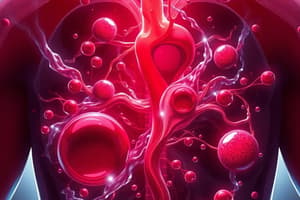Podcast
Questions and Answers
What percentage of body weight does the intracellular fluid (ICF) account for?
What percentage of body weight does the intracellular fluid (ICF) account for?
- 40% (correct)
- 33%
- 67%
- 20%
What percentage of total body weight does the extracellular fluid (ECF) account for?
What percentage of total body weight does the extracellular fluid (ECF) account for?
- 33%
- 15%
- 60%
- 20% (correct)
What is the percentage of body weight accounted for by interstitial fluid?
What is the percentage of body weight accounted for by interstitial fluid?
- 40%
- 15% (correct)
- 5%
- 25%
Which fluid compartment is present inside the blood vessels and lymph vessels?
Which fluid compartment is present inside the blood vessels and lymph vessels?
In which fluid compartment is the concentration of potassium the highest?
In which fluid compartment is the concentration of potassium the highest?
Which type of passive transport involves the movement of water to equalize gradient?
Which type of passive transport involves the movement of water to equalize gradient?
Which fluid compartment is referred to as 'the internal environment' of the body?
Which fluid compartment is referred to as 'the internal environment' of the body?
What is the main difference between diffusion through the lipid bilayer and diffusion through protein channels?
What is the main difference between diffusion through the lipid bilayer and diffusion through protein channels?
What type of channels are voltage-gated and ligand-gated channels?
What type of channels are voltage-gated and ligand-gated channels?
What does net diffusion require in order to occur?
What does net diffusion require in order to occur?
Flashcards are hidden until you start studying
Study Notes
Fluid Compartments
- Intracellular fluid (ICF) accounts for approximately 40% of body weight.
- Extracellular fluid (ECF) accounts for approximately 20% of body weight.
- Interstitial fluid accounts for approximately 10-15% of body weight.
Fluid Compartment Locations
- Plasma and lymph are present inside blood vessels and lymph vessels.
Ionic Balance
- The concentration of potassium is highest in intracellular fluid.
Passive Transport
- Osmosis is the type of passive transport that involves the movement of water to equalize gradient.
Internal Environment
- The extracellular fluid is referred to as "the internal environment" of the body.
Diffusion
- The main difference between diffusion through the lipid bilayer and diffusion through protein channels is the mechanism of transport: lipid bilayer diffusion is passive, whereas protein channel diffusion is facilitated.
- Voltage-gated and ligand-gated channels are types of protein channels.
Net Diffusion
- Net diffusion requires a concentration gradient to occur.
Studying That Suits You
Use AI to generate personalized quizzes and flashcards to suit your learning preferences.




